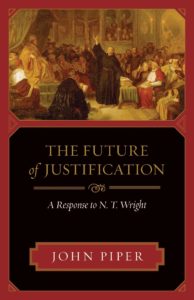Written By: Nathan Ecarma
Managing Editor
Book:Future of Justification; a Response to NT Wright
Author: Piper, John.
Although few students at Bryan participate in debate club, most participate in debate, or, rather, argumentation, especially of the theological sorts. However, most arguments tear down rather than edify as a result of students failing to understand how to deal with controversy. In Piper’s work The Future of Justification, he demonstrates how Christians ought to deal with controversy.

Infamous for Christian Hedonism, John Piper is a pastor, first and foremost. But he is also a scholar. His work The Future of Justification exemplifies both of these qualities. Simultaneously, Piper maintains a graceful spirit filled with resolve. Unlike some of those in the Reformed tradition, Piper does not anathematize Wright. Rather, Piper faithfully defends the biblical, historical, and Reformed perspective on justification in a graceful manner.
Piper begins his work with a chapter on controversy explaining the nature of his work. He does not desire to categorize Wright as a heretic, but rather to push his readers to “make wise judgements” in regards to the weighty issue of justification. While Piper fundamentally disagrees with much of Wright, he does well to use modals in his verb construction. Instead of speaking indicatively, he writes, “It may be that in his own mind and heart Wright has a clear and firm grasp on the gospel of Christ and the biblical meaning of justification” (15). Piper uses ‘seems,’ ‘might,’ ‘may,’ etc. in his writing. By doing this, he shows grace giving Wright an opportunity to clarify. While Piper speaks charitably towards Wright, he remains to be filled with resolve. He does not compromise the biblical doctrine of justification for the sake of peace.
Even though Piper spends many of his pages explaining Wright’s view, he responds with robust arguments interacting with Wright. Specifically, his explanation of the righteousness of God was profound and historically and biblically rooted. He writes, “The righteousness of God consists most basically in God’s unswerving commitment to preserve the honor of his name and display his glory” (66). Piper summarizes one of his older publications, which was thoroughly rooted with biblical texts, to defend his definition of the righteousness of God.

While the content in The Future of Justification possesses many strengths, part of Piper’s logical outworkings needs more proofs. Piper writes, “In other words, the oneness of God implies oneness in the way he justifies Jews and Gentiles, namely, by faith” (147). While this statement has logical sense, Piper does not proof it.
Piper explains Wright’s views with fairness. He does not take unclear aspects of Wright’s theology and exhaust the implications of these unclear aspects, but takes Wright’s theology only slightly past where Wright has taken them. Much of Piper’s explanation of Wright comes directly from Wright; he uses lengthy quotes and footnotes explaining Wright’s views. Even when Piper does not understand Wright’s views, he gives him the benefit of the doubt.
Ultimately, Piper’s conviction shows. He begins the book with a deeply rooted conviction on what it means to deal with controversy as a Christian, and then he proceeds to live out his beliefs in his interaction with Wright. By defending biblical truths for the sake of building up the body of Christ, Piper has ‘contended for the faith’ in a Christ-like manner. Even though this book was born out of controversy, it has encouraged me to be gracious with Wright while holding fast to biblical truths.
To end, Piper writes, “Faithful Christians do not love controversy; they love peace. . . But for this very reason they are bound by their conscience and by the Word of God to try to persuade the church concerning the fullness of the truth and beauty of God’s word” (32).
Bio
Nathan Ecarma studies Bible, culture, and language. He serves on the Worldview Initiative and as a Managing Editor for the school newspaper, the Bryan Triangle. In between theological conversations, he enjoys binge watching Netflix and attempting to sing his favorite songs. 



